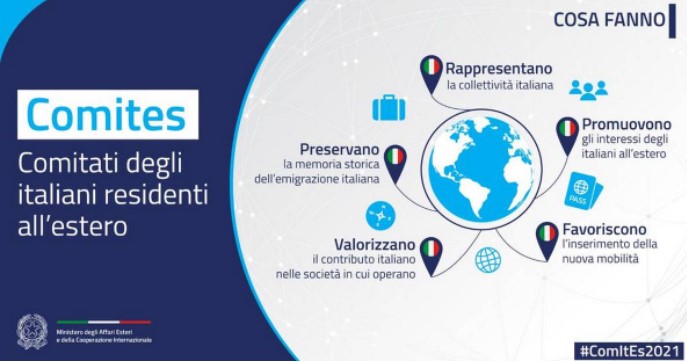
What are Comites, and what do they do?
In an attempt to try and resolve consular issues, an Italian citizen is likely to come across a reference to Comites. But what are these arcane bodies? What do they do? Where are they based?
COMITES CREATION
For most Italian citizens resident abroad, the Comites are a bit of a mystery. This is partly due to how these bodies were instituted in 1985, ratified by the “Legge 459/2001”. Essentially Comites are groups of elected citizens that can be created in any Consular constituency with over 3000 AIRE registered residents. Unlike other political elections, very regrettably, AIRE residents need to apply to vote for their local Comites. If you are unaware that elections are forthcoming, you will fail to register within the required timeframe. Several attempts at changing these rules were made throughout the years, but with no success. Each Comites has a number of elected members ranging from 12 to 18, depending on the size of the local Italian population. The local Consulates can even create Comites in some areas to make matters more complicated.
WHAT DOES A COMITES DO
A Comites remit is, in reality, comprehensive, but taking it from the law that created the definition is as follows:
Pursuant to art. 1, co. 2 of Law 286/2003, the Comites are representative bodies of Italians abroad in relations with diplomatic-consular representations.
Also through studies and research, they contribute to identifying the social, cultural and civil development needs of the reference community; promote, in collaboration with the consular authority, with the regions and local autonomies, as well as with bodies, associations and committees operating within the consular district, appropriate initiatives in matters relating to social and cultural life, with particular regard to participation of young people, equal opportunities, social and educational assistance, vocational training, the recreational sector, sport and leisure.
The Committees are also called upon to cooperate with the consular authority in protecting the rights and interests of Italian citizens residing in the consular district.
With such a broad definition, Comites could focus on many topics of interest to the local community. In reality, cooperation with consular authorities in protecting rights and interests, like attempting to mediate concerning the provision of essential services, is one of the areas that can be of most concern to these bodies. As for promotions and studies, these are related to the availability of funds, which is very scarce. The success ratio of Comites in dealing with consular authorities is very variable since Consulate aren’t in any statutory obligation to take heed of what a Comites tells them. Nevertheless, their voices carry more clout than that of a single citizen, particularly since many Comites members would also represent a political sphere (though the elections are non-political), which could have repercussions in Rome.
HOW DO I KNOW THERE IS A COMITES WHERE I LIVE?
Unbelievably a list of Comites exists only as a PDF file issued by MAECI rather than a leading online portal, as anyone would expect these days and age. Once a location has been found, the next option is either Google the right site (e.g. Comites Miami will display, among other links, their official site https://www.comites-miami.com/ and so on). The other option is to go to the location of the local Consulate (in the example in question, the Miami Italian Consulate General), where the link to the local Comites is usually displayed. It is a somewhat convoluted way of finding information which, with the almost undisclosed elections, turns the Comites into pseudo secret bodies through no fault of their own.
ISSUES
The scarce representation of elected Comites plays to their disadvantage as politicians can often appeal to their lack of relevance and therefore ignore recommendations. Secondly, inadequate funding is also a factor, given that except for some basic admin costs, there is very little money to fund reasonable activities. For example, the London Comites (one of the largest) published a total income of Eu59k in 2019, equivalent to just over 30 cents of Euro per capita. It would be impossible to create significant events for the local community with such a tiny amount. Finally, as Comites are such a close shop, the same people often run for elections. Of course, this is not allowed, but the local Consular authorities often ignore it. As for success factors, we are unaware that a sliding scale was ever created, so nobody can compare how effective Comites A is as opposed to Comites B. With so many issues at stake little wonder if not many Italians know of them.
CONCLUSION
In brief, it is a good thing to know about the existence of Comites. An Italian citizen could either gain valuable insight into local consular practice or raise an urgent issue in some instances. Depending on how well linked a Comites was, a resolution could even be reached. But there is no guarantee of practical assistance, and sadly all too often, Comites continue to be talking shops of little consequence to the life of the vast majority of Italian citizens abroad. Only sweeping changes (and more significant funding) may make them more relevant, but it is unlikely any solution will be announced in the complex political landscape of modern days Italy.


